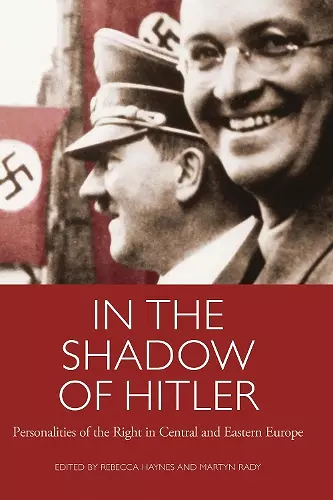In the Shadow of Hitler
Personalities of the Right in Central and Eastern Europe
Martyn Rady editor Rebecca Haynes editor
Format:Paperback
Publisher:Bloomsbury Publishing PLC
Published:18th Feb '14
Currently unavailable, and unfortunately no date known when it will be back

Many important right-wing political figures from the late nineteenth century and inter-war period have been over-shadowed in history by Nazi Germany and Adolf Hitler. In this book, the author assesses the careers of seventeen of the most important figures in right-wing politics in Central and Eastern Europe during this period.
Many important right-wing political figures from the late nineteenth century and inter-war period have been overshadowed in history by Nazi Germany and Adolf Hitler. 'In the Shadow of Hitler: Personalities of the Right in Central and Eastern Europe' reviews the careers of sixteen of the most important figures in right-wing politics in Central and Eastern Europe during this period. It includes politicians, ideologue sand 'men of action' in Germany and Austria, Hungary, Czechoslovakia, Ukraine, Poland, Romania, Serbia and Croatia. Some of these were Nazi sympathisers or contributed to the making of Nazi ideology. Others rejected German National Socialism in favour of rival nationalist and right-wing ideologies and programmes, deliberately distancing themselves from Nazism. As th epower and ambition of the Third Reich grew in the1930s, so many of the personalities reviewed here were obliged to come to terms with the shadow cast over the region by Nazi Germany and to make their own political and other compromises. This volume includes chapters on the principal fascist and right-wing politicians in inter-war Central and Eastern Europe - among others, Codreanu and Antonescu in Romania, Gombos and Szalasi inHungary, Ljotic in Serbia, Dmowski in Poland, Henlein and Tiso in Czechoslovakia - while also analysing the intellectual contribution to the development of the right made by an earlier generation including D'Annunzio, Schonerer and Fritsch. All of these 'personalities of the right' are recognized as influential in the development and making of right-wing politics in their home countries and internationally. Nevertheless, in most historical writing on the history of the European right, they have been generally accorded a lesser place since the focus of interest is so often directed upon Nazi Germany and its leader. It is the purpose of this volume to bring the right-wing leadership of late nineteenth century and inter-war Central and Eastern Europe out from under the shadow cast by Adolf Hitler.
"This book offers characterizations of sixteen 'personalities of the Right' from eight nations in Central and Eastern Europe, operating mainly between the wars. It provides an abundance of information, together with interpretive comments which are frequently illuminating. The large number and variety of case studies, including analyses of little known but intriguing figures like the Ustasha death squad leader Jure Francetic and the Hungarian exponent of anti-feminist, Cecile Tormay, allow general themes to develop. One is the autonomy and particularity of right-wing movements in the region which were not calques of the more famous fascist movements elsewhere in Europe, though these helped shape a climate receptive to anti-democratic ideas. Another concerns gradations on the Right between fascists, conservative authoritarians and those who subsequently expressed elements of repentance, a pattern not unfamiliar in the literature but where the careful mapping of psychology, ideology and conjuncture here supplied offers fresh perspectives. Two further themes are the sheer level of violence in the lives of several of the book's subjects, and the way in which traditional religion could provide organizational support for the Right and lend often pious radicals models for nationalist manifestations, martyrology and death cults. While the personalities in this book did feel their societies to be under threat, they were not modernist intellectuals. The challenges to which they reacted aggressively came from the massive disruption and violence of two world wars and from geopolitical upheavals posing specific problems, and provoking nationalism as a response. This is a well-conceived volume full of interesting material." Robin Okey, Emeritus Professor of History, University of Warwick, UK This book offers students of European history between the wars and in the aftermath of the Second World War useful information on a mixed assortment of 'leaders' who were 'in the shadow' of Hitler. English Historical Review 'an impressive panorama of right-wing personalities from Eastern and Central Europe, which enriches the research on fascism.' Sehepunkte
ISBN: 9781780768083
Dimensions: unknown
Weight: 404g
344 pages